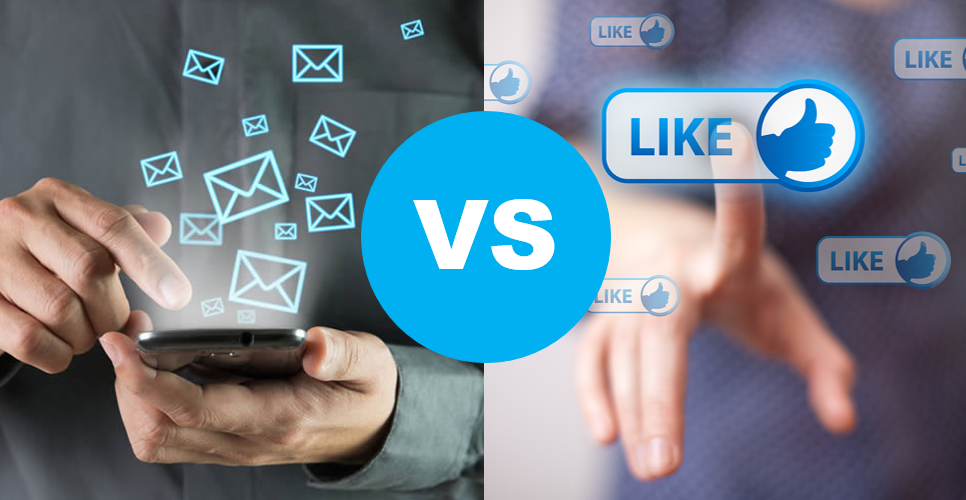
Email marketing and social media marketing are two of the most effective digital marketing strategies for promoting your business. Both present distinct opportunities and challenges that must be considered when developing marketing campaigns. Ultimately, the success of your marketing strategy will rely on both channels.
- Email marketing vs social media: Reach
- Email marketing vs social media: Engagement
- Email marketing vs. social media: ROI
- Email marketing vs social media: Targeting
Email marketing vs social media: Reach
Social media is much easier to reach than email. Millions of people on Facebook, Twitter, Instagram, and TikTok may be your ideal customer. Every day, new users join, so the potential reach of your social media strategy is virtually limitless.
Hashtags are essential for effective social media marketing. The use of social listening tools like Rite Tag can help you find relevant hashtags for your business. Using these hashtags in your social media posts will increase your visibility among users who already like your content.
Conversely, email marketing only reaches your list’s subscribers. You can promote your list through other channels, but there must be a compelling reason for your audience to sign up. Sending an email campaign to someone not on your list violates privacy laws like GDPR and CAN-SPAM.
Email marketing vs social media: Engagement
In terms of customer engagement, social media clearly wins. With social media, you can create more interactive content for your audience. This could be a funny video or a useful tip that someone wants to share with their friends.
These are the engagement metrics that social media management tools like Hootsuite track. These tools help you understand what content best engages your audience so you can shape your social media strategy accordingly.
Emails lack similar engagement metrics. Sure, someone can forward an email to a friend, but email is private, making this difficult to measure and optimize. Instead, the subject line is your best chance for email marketing engagement. Making the subject catchy and appealing increases the chances of your email being opened and read.
Also, social media is easier to brand than marketing emails. Customers learn about new brands on social media before joining your email list. As a result, your social media profile is probably the first place your customers learn about your company.
Is your brand fun and lighthearted or formal and serious? Can I contact you via social media or is there another way? These answers will influence your customers’ first impressions and likelihood to engage further.
Email marketing vs. social media: ROI
Email marketing has the best ROI. According to Litmus research, every dollar spent on email marketing returns $36 USD, which can significantly impact your bottom line.
A large part of this ROI comes from your audience actively signing up for your emails, showing interest in the content you want to send. A CRM-integrated email marketing tool, or an all-in-one solution like HubSpot, can also populate dynamic content based on the products or services each recipient is most likely to buy.
However, social media marketing is less effective than email marketing at converting sales, so the ROI is lower. While more people see a social media post promoting a product or service than an email, the proportion who click the link and buy is significantly lower.
Due to the inherent diversity of social media audiences. Many social media users will be interested in your business, but many more will be uninterested. Email marketing audiences are more ROI-optimized than social media users in general.
Email marketing vs social media: Targeting
Email offers more first-party data than social media, making it better for targeting specific customers. If you connect your email and e-commerce platforms, you can segment your audience based on demographics, purchase history, and other characteristics.
For a campaign promoting a new product launch to customers who have previously purchased similar products, you may want to tweak the messaging slightly. Or, send a special offer to customers who haven’t purchased add-ons. Some platforms, like Mailchimp, allow for intelligent segmentation with just a few clicks.
You can target social media ads based on age, gender, and location, but the quality and detail you get with email marketing is unmatched. Email marketing offers better targeting without the added cost of social media targeting.
Is email marketing better than social media?
Both email and social media marketing have benefits and drawbacks that make them useful for different goals.
Email is generally better for strategic growth. Your contacts have opted in to receive direct communications from you, increasing the likelihood of sales and conversions. And as third-party cookies fade away, you won’t lose access to your email contacts. Your email list will be the same regardless of platform. Building an email list takes time and effort, and it can be difficult to keep people from unsubscribing.
However, social media is best for customer engagement and building rapport, which can help you grow your email lists. Unlike email, social media posts can “go viral” because they aren’t limited to a single list of followers. Your social media following can grow rapidly as you reach new audiences.
Email and social media don’t have to be mutually exclusive to achieve your marketing goals. Email is best for long-term customer relationships and ROI opportunities, while social media is great for growing your audience and brand recognition. Both parts are required to market your business.